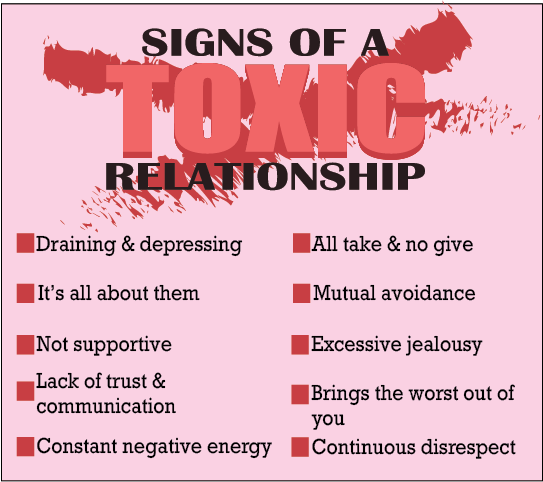The culture of toxic relationships is rampant among teens today, so it’s important to discuss how to recognize and avoid it. I was involved in a toxic relationship once, and I hope to help others identify if they are too.
When someone is “toxic,” it means they’re not doing things in your best interest. This is especially prevalent in the LGBTQ+ community and among minority teens in today’s society, as they are statistically more likely to experience domestic violence and toxicity from their partners.
How to identify a toxic relationship

Verbal abuse and boundaries
One aspect of toxic relationships is verbal abuse. Often the sign of a toxic relationship is an overall controlling nature, such as not letting you spend time with other people or spending time away from your partner. This controlling nature can be visible through signs of jealousy, but if it gets to the point where your partner explicitly says you can’t do something or go somewhere, that’s also emotional manipulation. Another part of verbal abuse is making yourself feel like you’re nothing if you’re not with your partner, saying, “Without me, you’re nobody” and similar phrases.
If your partner doesn’t respect you, you’ll know the second they tell you, ignore something you’re passionate about or make sarcastic comments about you. Disparaging comments are something most couples make as playful jokes, but if you don’t like it and you tell them that, and they won’t stop, it becomes toxic.
If you repeatedly tell someone you don’t like the behavior they’re doing, like yelling or making fun of you, but they keep doing it anyway, that’s toxic and needs to be done. end. No one should make you feel bad for wanting alone time or space, especially if you’re upset or stressed. If you need a break from people to relax, but they refuse to let you, that’s common toxic behavior. If he refuses to change or doesn’t make an effort to become a better person, you should take a break from him.
I remember dozens of times I had to leave for work, but my ex-girlfriend started freaking out and saying, “If you love me, you’ll stay.” She never wanted me to leave, even for a little while to take a shower or have a snack. I knew she was too controlling but didn’t speak for me because I thought it would make her mental state worse. Little did I know that severing the relationship would help both of us in the long run and allow me to escape all the toxicity of it.
Dating someone who suffers from mental illness (depression, anxiety, etc.)
I suffer from depression, anxiety and ADHD so I am knowledgeable about mental illness. I want to make it clear that if you or a loved one has a mental disorder, it doesn’t affect your love for each other, you’ll probably be strong enough to pull through. If you’re afraid to leave your partner because of their toxic behavior but you’re worried about making their illness worse, you should still leave them. If this is when you’re taking breaks in your relationship and feeling helpless, then a breakup might be best.
The reason I am writing this article is because I know how much it hurts. Leaving someone emotionally vulnerable is one of the worst and saddest feelings imaginable, even if you know you’re putting yourself first. You should always put yourself first when it comes to emotions because there are a lot of things in life that you can’t control, like how other people feel.
You are important, and so is your sanity. If your partner keeps saying or doing triggering things, with the knowledge that upsets you, that’s not okay. No one should make fun of your sanity, no one should knowingly hurt you in this way. If this happens again, I implore you to tell them that if they don’t stop, you will leave them. If they really, really like you, then they’ll have your best interests at heart.
My friend once told me that she wanted to break up with a girl but thought she shouldn’t for fear of depressing her. She told the girl about it anyway, and the girl really understood and took it very well. She realized and identified the toxic behaviors she was having and welcomed the break, showing that sometimes the outcome really isn’t as bad as you think it’s going to be.
Fights (and what to do if physical violence is suspected)
Everyone has fought with their partner and it’s normal to have a little argument now and then. What is not normal is for these arguments to become physically, emotionally or verbally violent. If you argue almost every day with your partner and you always end up crying after these altercations, it is better to end him. If your partner is physically abusive, slamming doors, yelling/yelling/yelling, breaking things, hitting/kicking/pushing you or anything around you, then you need to tell a trusted adult . If you trust your parents, please tell them. If not, tell another trusted adult. These include teachers, family friends, your friends and their parents, your therapist, or a school counselor. In particular, anyone who works in a school setting can report your abuse and ensure that you and the person who hurt you get the help they need.
If you don’t trust anyone, then I want you to take a leap of faith. It’s best to talk to someone who is nice and kind to you, even if you don’t trust them yet. They might surprise you by always being nice to you and trying to help you through this ordeal. If you or someone you know is experiencing physical abuse, I will set up the hotline at the end of the article for you to call or text.
If someone you know is being physically abused, it is best to alert the authorities and tell the person to call these helplines. Not everyone knows exactly what to do in these cases, but if you are able to call a phone, you can get help. These numbers also work for payphones.
Direct lines:
- (US) https://www.loveisrespect.org/ Has numbers to call, text and video chat with someone who can help you. They have options on the website for you to be discreet when talking to them, and easy ways to leave the website if your abuser enters. This is specially designed for young adults and teenagers. It contains articles on dating abuse as well as a resource to read.
- (UK) http://www.refuge.org.uk/get-help-now/phone-the-helpline/
- (Australia) https://www.whiteribbon.org.au/Find-Help/Help-Lines
- (Brazil) www.mndh.org.br
- (Costa Rica) www.inamu.go.cr
- (Mexico) Tel. : 56 82 79 69; Cell: 59 04 70 65; Fax: 55 43 47 00 www.laneta.apc.org/adivac
- (Europe) https://ec.europa.eu/justice/saynostopvaw/helpline.html
- (Middle East Countries) https://www.hotpeachpages.net/mideast/index.html
- (African countries) https://www.hotpeachpages.net/africa/
The websites above are not sponsored or promoted by Teen Magazine, but are here to help.






